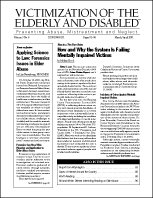New Treaty on Disability and Legal Capacity, Part I
Author: Clarence J. Sundram, Esq..
Source: Volume 09, Number 03, September/October 2006 , pp.35-36(2)

< previous article |next article > |return to table of contents
Abstract:
This is the first of a multipart series exploring the subject of legal capacity of persons with disabilities. The next installment will discuss how the supported decision-making model works and whether it could eliminate guardianships. In working with people who are elderly or disabled, one of the key issues service providers, protective services workers, and advocates struggle with is the legal capacity of the individual. If the person has decision-making capacity, then one must respect the decisions and choices made, even if they seem unwise, imprudent, and even potentially dangerous. But if the person lacks such capacity, the obligation of the provider, protective service worker, or advocate changes, and intervention to prevent harm to the individual may be required. Traditionally, there have been several general propositions in law that have helped people faced with the question of whether or not to intervene. This article goes on to discuss these and their implications.Keywords: legal capacity of persons with disabilities; decision-making capacity; U.N. Treaty on Rights of People With Disabilities
Affiliations:
1: .